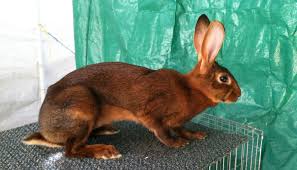
Belgian Hare Rabbit
Conditions of detention
Belgian Hares require a spacious enclosure with plenty of room to exercise. They are highly active and need an environment that allows them to stretch and run.
Useful Fact: A large, secure outdoor run is ideal for this breed to satisfy their need for space and exercise.
Nutrition and diet
Their diet should consist primarily of high-quality hay, fresh vegetables, and a controlled amount of rabbit pellets. Freshwater should always be available.
Useful Fact: Due to their high activity level, they may require more food than less active breeds, particularly during growth and development.
Health
Belgian Hares are generally healthy but can be prone to stress due to their high energy levels. Regular exercise and a calm environment are crucial.
Useful Fact: Keeping their environment calm and stress-free can help prevent health issues related to anxiety.
Grooming and care
They have a short coat that requires minimal grooming. A weekly brushing is usually enough to keep their fur in good condition.
Useful Fact: Despite their short fur, regular grooming during shedding seasons can help manage loose fur and reduce the risk of hairballs.
Education and training
Belgian Hares are intelligent but can be more challenging to litter train due to their high energy levels. Patience and consistency are key.
Useful Fact: Start litter training early, and use positive reinforcement to encourage good habits.
Toys and entertainment
They enjoy a variety of toys, especially those that allow them to dig, chew, and explore. Providing enrichment is essential for their mental well-being.
Useful Fact: Interactive toys that challenge their intelligence are ideal for keeping them engaged and stimulated.
Safety
Ensure their living space is safe and secure, as Belgian Hares are strong jumpers and can escape if not properly enclosed.
Useful Fact: Consider using a high-sided enclosure or secure outdoor run to prevent escapes and keep them safe from predators.
Accessories
Essential accessories include a water bottle, a sturdy food dish, a large litter box, and plenty of enrichment items such as tunnels and chew toys.
Useful Fact: A large, sturdy exercise pen is recommended to provide the space they need to stay active.
Socialization
Belgian Hares are social animals that enjoy interaction with humans and other rabbits. However, they may be more skittish than other breeds due to their high energy.
Useful Fact: Gradual, gentle handling from a young age helps them become more comfortable with human interaction.
Travel and Transportation
When traveling, use a large, secure carrier that allows enough space for the rabbit to move comfortably.
Useful Fact: Placing a familiar blanket or toy in the carrier can help reduce stress during travel.
Behavior and psychology
Belgian Hares are known for their high energy, alertness, and speed. They require a lot of space and mental stimulation to stay happy.
Useful Fact: Due to their athletic build, they may exhibit more “wild” behavior, so providing a stimulating environment is essential.
Legal aspects
There are generally no specific legal restrictions on owning Belgian Hares, but local regulations regarding pet ownership should be checked.
Useful Fact: If planning to show Belgian Hares, ensure they meet the specific breed standards set by rabbit breeding organizations.


